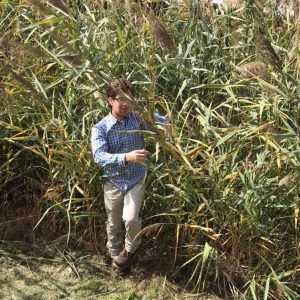BY CORY MORRISON
Sheridan’s Mission Zero team in the Office for Sustainability has been removing phragmites to benefit the environment outside Trafalgar Campus. Kayanase, an ecological restoration, and native plant and seed company, which is located in Ohsweken, Ont., has been helping Mission Zero with the phragmites removal process.

Michael Melro, a communications coordinator in the office, said that phragmites and other invasive species do have harmful impacts which include:
-
- Growing quicker than other plants.
-
- Overcrowding native plants.
-
- Growing in water sources leading to absorbing water.
-
- Secreting poison which goes into the soil and degrades it, which doesn’t allow animals to feed.
- Little sunlight going through other plants.
“There are natural and indigenous phragmites which don’t affect other species, but these ones are called phragmites australis,” he said. “They spread poison and don’t allow certain animals to feed in there.”
Nathan Nettleton, a facilities project technologist in the office, said that removing phragmites on campus can have a positive impact on biodiversity.
“It benefits the environment because it allows for natural heritage of biodiversity that we have in this particular climate,” he said. “When you have something like phragmites, what happens is that it spreads out three metres a year horizontally. Other plants can’t compete, they start to die out slowly, and all you have left is phragmites. Once you lose biodiversity, you start to lose other animals that depend on the various amount of plant materials that were available before.”
Despite the team and others wanting to prevent the spread of phragmites and other invasive species, Nettleton said it is hard to prevent the spread.

“It would have to be province-wide, but the way we can try to control it here is to eradicate it from the area where it is on campus, and then from there, continue to be vigilant to take it on in small amounts,” he said.
“When it first starts to come into an area, it might be one or two shots, and then in a couple of years, it may be 100 to 200. It spreads really fast.”
Nettleton also said that it would be essential to know exactly where phragmites and other invasive species are growing to prevent the spread.
In the future, the team hopes to replace phragmites with more native plants to benefit other species.
“There are birds that like to nest in the area because they like how crowded it is, and there is good protection,” Melro said. “The native species we are bringing in will do a much better job.”
Melro said that the phragmites removal process is proceeding well.
“It is a physical struggle because it is hard work, but we have a group that is ready to do it, and there have been no obstacles regarding the environment,” he said. “Kayanase hires specialists to remove them.”
Melro said that the team uses methods to remove phragmites which include:
- A physical and mechanical removal with machines to chop them down.
- Workers eliminating phragmites in sections because they are aggressive enough to grow back.
- Workers applying herbicides during the second phase of the phragmites removal, which the team is currently on.
- Workers using special techniques, so only phragmites are targeted instead of other species to prevent soil erosion.
“It does not look like they are stopping to grow, but they are dying from the inside out,” he said. “They are getting darker, and you will start to see there is a greying on the tips, so they are not as strong as before. We are going to have to do another mechanical removal coming up in the spring, and then we will have to reapply the herbicides because it is quite a large area.”
Video by Cory Morrison/Sheridan Sun.
Melro and his team want to do the phragmites removal process in small steps to be as careful as possible.
For more information about phragmites removal, email missionzero@sheridancollege.ca or follow on Twitter or Facebook.
Map by Cory Morrison/Sheridan Sun.
